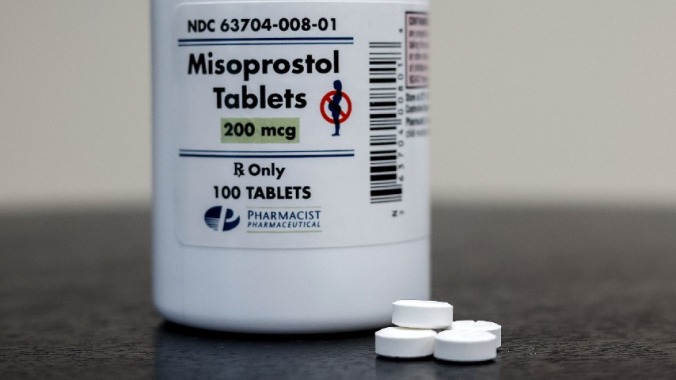Louisiana Hospitals Preemptively Pull Life-Saving Medication Ahead of New Anti-Abortion Law
The state already has one of the highest maternal mortality rates in the nation. Now, hospitals are being forced to remove a drug used to stop hemorrhaging from birthing carts because the state's GOP lawmakers passed a law to classify it as a "controlled dangerous substance."
Photo: Getty Images AbortionPolitics Louisiana
In 2019, Louisiana’s Health Department ranked the state 47th out of 48 states on maternal mortality for Black women. Despite this, in May, Louisiana became the first state in the country to criminalize mifepristone and misoprostol, a wildly dangerous decision that is reportedly already threatening new mother’s lives.
Taken together, the two pills are the most common drugs used for medication abortion, which is what led GOP lawmakers in the state to ban and classify them as “controlled dangerous substances.” Separately, the medications are used in a range of medical situations, from miscarriage to IUD insertion. The World Health Organization recognizes misoprostol as an essential medication, particularly to stop life-threatening postpartum hemorrhaging, which is a leading cause of maternal mortality. But, according to journalist Lorena O’Neil, hospitals are preemptively removing the drug from birthing carts out of caution, confusion, and a lack of guidance from the state, ahead of the law taking effect on October 1,
Reporting for the Louisiana Illuminator, O’Neil spoke with doctors who said they were aware hospitals started removing the medication from carts when Louisiana Gov. Jeff Landry (R) signed the bill in May. These carts typically hold easily accessible, life-saving medications like misoprostol so doctors are prepared to act immediately if someone starts to hemorrhage. But Louisiana’s soon-to-be law would require doctors to obtain it from a pharmacy since it’ll be classified as a “controlled substance,” and, consequently, severely limit their ability to save lives.
One doctor told the outlet they’ve worked at rural hospitals where “trying to get a simple headache medication released” has “taken 45 minutes,” with doctors forced to call pharmacies because their hospital doesn’t have its own pharmacy. “In these [hemorrhage] situations, you don’t have 45 minutes,” the doctor told O’Neil. At least one doctor working at a rural hospital in the state wasn’t even aware that the law was about to take effect until informed by the Illuminator, as the state of Louisiana has yet to issue guidance on how hospitals are now expected to save hemorrhaging postpartum women’s lives. “What? That’s terrifying,” this doctor said when told of the law. “Take it off the carts? That’s death. That’s a matter of life or death.”
-

-

-

-

-

-

-

-

-

-

-

-

-

-

-

-

-

-

-

-

-

-

-

-

-

-

-

-

-

-

-

-

-

-

-

-

-

-

-

-








































